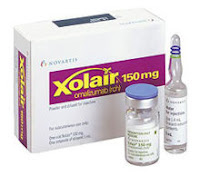 Omalizumab (Xolair) is a monoclonal antibody made by Genentech/Novartis. In more detail, it is a recombinant DNA-derived humanized IgG1k monoclonal antibody that selectively binds to human immunoglobulin E (IgE). Omalizumab binds to Cε3 region of IgE.
Omalizumab (Xolair) is a monoclonal antibody made by Genentech/Novartis. In more detail, it is a recombinant DNA-derived humanized IgG1k monoclonal antibody that selectively binds to human immunoglobulin E (IgE). Omalizumab binds to Cε3 region of IgE.Omalizumab is approved by the FDA for treatment of moderate-to-severe allergic asthma and chronic urticaria.
The Epidemiologic Study of Xolair (omalizumab): Evaluating Clinical Effectiveness and Long-term Safety in Patients with Moderate-to-Severe Asthma (EXCELS) assessed the long-term safety of omalizumab in a clinical practice setting as part of a phase IV FDA postmarketing commitment.
EXCELS was a prospective observational cohort study in patients aged 12 years or older with moderate-to-severe allergic asthma. There were 2 cohorts: omalizumab (taking omalizumab at baseline) and nonomalizumab (no history of omalizumab treatment). Median follow-up was 5 years for both cohorts. Crude malignancy rates were similar in the omalizumab and nonomalizumab cohorts, with a rate ratio of 0.84. Hazard ratio (omalizumab vs nonomalizumab) was 1.09.
Omalizumab therapy is not associated with an increased risk of malignancy.
However, asthma drug Xolair is associated with a higher risk of heart attack, mini-stroke, chest pain, blood clots - FDA announced in September 2014: http://reut.rs/1uug5z6
References:
Incidence of malignancy in patients with moderate-to-severe asthma treated with or without omalizumab. Aidan Long et al. Journal of Allergy and Clinical Immunology
Volume 134, Issue 3, Pages 560–567.e4, September 2014
http://www.jacionline.org/article/S0091-6749(14)00204-8/abstract
Images: Mechanisms of action of omalizumab. JACI, 02/2008.
Image source: Wikipedia, public domain.